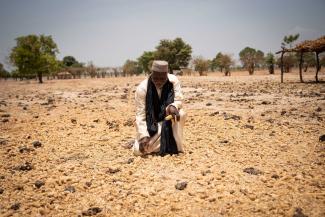Multiple crisis
ECOWAS adopts climate strategy
 picture alliance/dpa/MAXPPP /| Nicolas Remene / Le Pictoriu
picture alliance/dpa/MAXPPP /| Nicolas Remene / Le Pictoriu
In April, the Economic Community of West African States (ECOWAS) adopted a joint strategy to tackle climate change. Domains like land erosion, preservation of forests’ carbon stocks and coordinated food storage will get additional attention and funding. After a year-long decision-making process, the national leaders of the 15-member alliance approved the blueprint during a two-day meeting in Accra, the Ghanaian capital.
Individual member states have been pursuing separate programmes to tackle climate issues. Countries like Senegal and Ghana run several globally-backed projects to combat the harsh impacts of climate change. Other countries too are forced to take special measures to protect their coastlines. Nonetheless, the new strategy is a significant step that takes regional cooperation to the next stage.
Multi-pronged approach
The strategy is taking a multi-pronged approach. Local institutions, civil-society groups and government agencies in member nations are expected to join in coordination and implementation. The document contains separate objectives for sectors like transport, agriculture, energy, land use, water and health. With support from the EU and other international donors, the new regional policy commits ECOWAS to spending € 278 billion in the next decade. The EU and its members are expected to contribute most of this money. The strategy is in line with the Paris Agreement on Climate Change. However, it is not clear to what extent EU governments are committed to the ECOWAS strategy and what funding they will actually provide.
“Climate change transcends borders,” said Sékou Sangaré, the ECOWAS commissioner for agriculture, environment and water resources. According to him, all member countries feel increasingly extreme weather conditions. Impacts include floods, heat waves and coastal erosion. “We must assess and respond,” the commissioner added.
“Nowhere is there more light, warmth and moisture than in West Africa,” wrote renowned British environmentalist David Attenborough three decades ago in his book “The living planet”. Sadly, things are deteriorating. The African continent disproportionately bears the brunt of global warming. While ECOWAS countries are responsible for less than two percent of greenhouse-gas emissions globally, their temperature rise is 1.5 times higher than the global average. The politically unstable region houses nine of the 30 countries most susceptible to harmful climate impacts.
Inhabitants in several coastal regions and islanders complain of invasive sea waves and eroding land. Erratic rainfall and extended periods of the scorching sun mean severe disruption to agricultural activities. All parts of the Sahel region on the southern side of the Sahara desert are recurrently suffering drought, and water resources are being depleted. According to World Bank estimates, over 32 million people could be forced to relocate from their homes by 2050 throughout West Africa.
For an increasing number of communities, food security can no longer be taken for granted (see Paolo Cernuschi for the case of Niger on www.dandc.eu). The region’s multiple crises are leading to political instability, civil strife and fragile statehood (see Vladimir Antwi-Danso on www.dandc.eu). Higher grain prices on the world market due to Russia’s attack on Ukraine are compounding problems.
West Africa is home to about 400 million people. The population is expected to grow to about one billion in 2050. Experts argue that immediate action is needed to make sure things do not deteriorate further. Tackling climate challenges is the right way to start.
Karim Okanla is a media scholar and freelance author based in Benin.
karimokanla@yahoo.com
